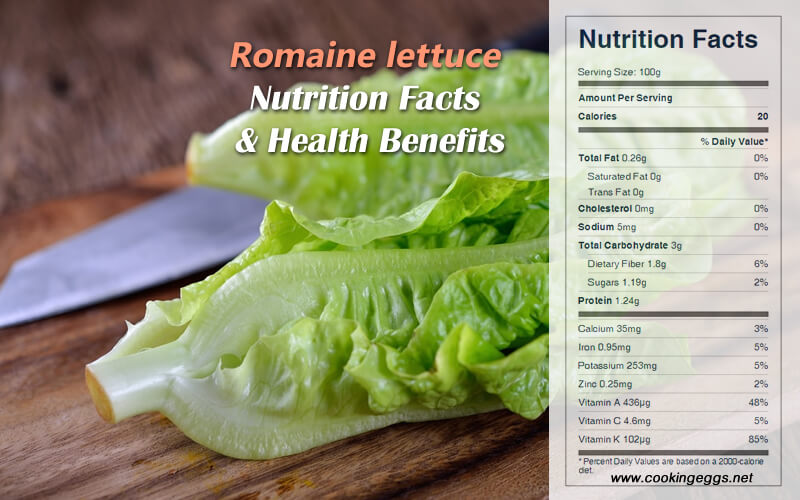Romaine lettuce Nutrition Facts & Health Benefits
Romaine lettuce is a common salad green. As with other dark leafy greens, the antioxidants found in romaine lettuce are believed to help prevent cancer. This article focuses on the health benefits of lettuce.
Almost all of the lettuces are low in calories and high in fiber and provide vitamins A, C, and K; B vitamins, thiamine, niacin, pantothenic acid, and folate; carotenes, including beta-carotene, lutein, and zeaxanthin; and the minerals manganese, potassium, and iron. Romaine is an excellent source of vitamins A, C, and folate, as well as the minerals manganese and chromium. It also provides vitamins B1 and B2, potassium, molybdenum, iron, and phosphorus. Many of the leaf lettuces offer nearly as good a nutrient profile as romaine, so you don’t need to give up variety.

The Nutritional Composition of Romaine Lettuce
One cup of shredded raw romaine provides 8 calories, 1.4 g carbohydrate, 1 g protein, 0.2 g fat, 1 g dietary fiber, 1456 IU vitamin A, 14 mg vitamin C, 76 mcg folic acid, 162 mg potassium, 4 mg sodium, 26 mg phosphorus, 20 mg calcium, and 4 mg magnesium.
Romaine lettuce Nutrition Facts Label
Health Benefits of Romaine lettuce
The minerals present in lettuce include calcium, magnesium, phosphorous, iron, sodium, potassium, zinc, and several vitamins, such as thiamin, riboflavin, folate, niacin, vitamins B6, C, E, A, and K.
Lettuce is a very low-calorie vegetable with almost no fat. One shredded cup of lettuce has only 12 calories and is very good for weight loss.
Lettuce has a very high fiber and cellulose content, which helps to remove bile salts from the body, which ultimately leads to the breakdown of cholesterol and hence is friendly to heart health. The fiber in this leaf vegetable purportedly binds with bile acids so that both get eliminated via the bowels. This function promotes the liver to produce more bile acids, consequently lowering the body’s overall cholesterol levels.
Romaine lettuce is rich in vitamin C, which makes it a heart-healthy vegetable; vitamin C is a powerful natural antioxidant, developing resistance against infectious agents and scavenging harmful, proinflammatory free radicals. The vitamin C and carotene in lettuce synergistically prevent the oxidation of cholesterol and the buildup of plaque. Specifically, vitamin C stops cholesterol from becoming sticky and adhering to the blood vessel wall. One to two servings of romaine lettuce in the daily diet are recommended to keep the heart healthy.
Romaine lettuce is rich in vitamin K, which has a positive impact on bone development, muscle strength, and blood clotting properties. Vitamin K is a key component in bone metabolism, which helps to increase bone mass by promoting osteoblastic activity in the bone cells and is utilized in the treatment of Alzheimer’s disease patients by limiting neuronal damage in the brain.
Romaine lettuce has a 2/1 ratio of omega-3 to omega-6 fatty acids. This is good for fat metabolism. This particular variety has 20% of its calories from protein.
A dietary carotenoid in lettuce is zeaxanthin, which gets selectively absorbed into the retinal macula lutea and provides an antioxidant which filters retina-damaging UV rays.
The mineral content of lettuce aids in the removal of toxins and the maintenance of an acid-alkaline balance.The pH balance in the human body is crucial to maintaining elastic, youthful skin; restful sleep; physical energy; reducing colds, flues, and headaches; aiding digestion; less propensity for arthritis; less probability of osteoporosis; and increasing mental acuity and mental alertness.
Lettuce is high in B-complex vitamins like thiamin, vitamin B-6 (pyridoxine), and riboflavins, which boost immunity and overall health.
Lettuce also is reported to have a glycemic index of 15 but its glycemic load is considered zero because of its low-calorie value. Lettuce is well recognized as an antidiabetic superfood because of its low glycemic index, which helps to maintain body weight.